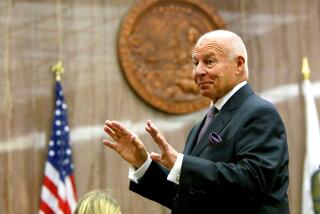Comedy gold: Watch three U.S. judges dismantle a copyright troll’s case
Prenda Law Group, the notorious law firm that disbanded soon after a Los Angeles federal judge accused it of operating a “porno-trolling collective” and slapped its principals with steep contempt sanctions, was back in court Monday to appeal the judge’s order.
Hilarity ensued, as you can tell from the above video of the court proceedings. (The fun starts at about the 59:47 mark.)
Remember Prenda Law? Its principals, who included attorneys John L. Steele and Paul Hansmeier, cooked up a neat little trolling scheme a few years ago. As we described it in 2013, Prenda collected Internet identification numbers — in technical jargon, “IP addresses” — of computers that might have been used to download pornographic movies for free.
The firm then contacted owners of the Internet accounts linked to those computers, accusing them of piracy and threatening them with a lawsuit, a $150,000 legal penalty and, worse, public exposure. Prenda offered to make the case go away for a nominal fee — say $4,000. “This was an ingenious, crooked, extortionate operation,” Appeals Judge Harry Pregerson, 91, observed during Monday’s court session.
Thousands of letters went out all over the country to unwitting targets , whom Prenda never really intended to sue. But the scheme began to come apart when the Prenda gang landed in front of federal Judge Otis D. Wright in L.A.
After a lawyer for targets of the scheme presented evidence showing that Prenda had falsified a document validating the copyright claim to one of the pornographic films --the signature belonged to a caretaker of Steele’s rural cabin, who testified that the paper was a forgery--Wright asked the Prenda lawyers to explain their legal strategy in the copyright cases.
They pleaded the Fifth.
He responded by slapping them with civil and criminal contempt charges and penalties of more than $80,000. Prenda and its personnel have run similarly afoul of federal and state judges in Massachusetts, Minnesota, Illinois, Georgia and San Francisco. (The list is courtesy of Ken White of the legal blog Popehat, who has tracked Prenda as assiduously as some rock fans used to follow the Grateful Dead.) Prenda eventually disbanded, but Steele, Hansmeier and others may still be on the hook for Wright’s penalties.
That brings us to Monday’s proceedings in Pasadena before a three-judge panel of the 9th Circuit U.S. Court of Appeals--Pregerson, Richard C. Tallman, and Jacqueline Hong-Ngoc Nguyen--where an appellate lawyer for Prenda’s principals tried to get Wright’s sanctions reduced or overturned.
It didn’t go well.
Prenda’s lawyer, Daniel Voelker of Chicago, tried to stick to the procedural flaws in Wright’s order. The judges weren’t buying it. They wanted Voelker to address the accusations of misconduct Wright had laid down, which included their ignoring his order to stop sending dunning letters to targets.
Voelker kept replying that he wasn’t familiar with the details of the case before Wright, though he tried to cast doubt on some of the allegations. His problem was that the judges on the panel seemed to know the case backward and forward.
“You don’t know anything about the background of this case?” Pregerson asked incredulously. “Is that what you’re telling me?”
“Come on, Mr. Voelker,” Tallman snapped at one point. “I’m not making this stuff up. I read it in the record.”
The judges were especially amazed that Voelker was seeking to have the criminal contempt sanctions remanded to Wright’s court for further procedural hearings, given that the maximum federal penalty for criminal contempt is life imprisonment.
“Is that they want, even if they’re looking at a potential life in prison?” asked Tallman, his eyebrows raised almost to the ceiling.
“They want their day in court,” Voelker insisted.
The judges reserved judgment. Popehat’s White, who live-tweeted the proceedings Monday, conjectures that the judges will uphold Wright’s civil sanctions but send the criminal contempt case back to Wright for more hearings. “That’s not good for Prenda,” he wrote.
The judges seemed to take the case especially seriously because it amounted to using “our court system for illegal purposes, to extort money,” Pregerson declared. He and his colleagues seemed aware that the Prenda cases have risen to the status of courthouse legend nationwide.
“This is going to be written about for years and years,” Pregerson told Voelker. “You’re probably going to be part of the story.”
Keep up to date with the Economy Hub. Follow @hiltzikm on Twitter, see our Facebook page, or email [email protected].
More to Read
Inside the business of entertainment
The Wide Shot brings you news, analysis and insights on everything from streaming wars to production — and what it all means for the future.
You may occasionally receive promotional content from the Los Angeles Times.











